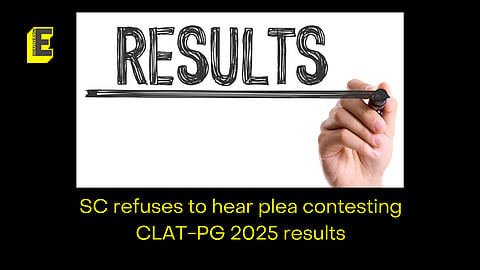

In a significant development, the Supreme Court declined to entertain a petition challenging the results of the Common Law Admission Test (CLAT) Postgraduate (PG) 2025. This was stated in a report by The Indian Express.
The plea was filed by several aspirants who alleged discrepancies in the merit list and accused the Consortium of National Law Universities (CNLUs) of procedural irregularities.
During the hearing, the bench, led by Justice Sanjay Kishan Kaul, refrained from interfering in the matter. "We cannot open the floodgates of litigation by delving into academic disputes," Justice Kaul remarked, emphasising the court's reluctance to intervene in cases involving university examinations unless clear evidence of procedural violation is presented.
The petitioners claimed that the consortium had failed to maintain transparency in evaluating answer sheets and awarding marks. They argued that the lack of a grievance redressal mechanism left candidates with no recourse to address discrepancies.
However, the court noted that the CNLUs, being autonomous bodies, possess the expertise to handle such matters internally.
The consortium’s legal representatives defended their procedures, asserting that the results were declared after a robust evaluation process. They further emphasised that the grievance raised lacked substantial proof to warrant judicial intervention.
With over 50,000 students appearing for CLAT PG 2025, the examination is a gateway to postgraduate legal education at National Law Universities (NLUs). The court’s decision to steer clear of the dispute underscores the judiciary’s cautious approach to academic litigation, emphasising the autonomy of educational institutions.
This judgment is a critical reminder of the balance between institutional independence and the rights of students, leaving many to debate whether existing frameworks ensure adequate fairness and transparency.
